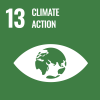
Waste is a problem affecting all regions in the country. The accumulation of waste not only causes unpleasant odors, but also becomes a hotbed for disease development.
Kuden residents in Piyungan district, Bantul regency, also experience this problem. This sub-village has land cover dominated by vegetation and agricultural land. The dominance of this land cover produces organic waste, such as litter and agricultural residues.
However, so far the residents resolve the waste problem by burning it. These methods produce pollution and make the environment look dirty. This condition is exacerbated by the slum-looking village arrangements.
Most of the Kuden residents are farmers and brick makers, meaning that they earn only a little. Despite having enough free time after working in the fields, waste and environmental problems in this village have not been resolved properly.
“This is because the farmers have no program to resolve the waste problem,” said Naufal Fattah Tastian, UGM student who participated in the Student Creativity Program UGM 2019.
The team offered a solution to the Kuden residents through worm reactors to resolve the waste problem. The team consisting of Naufal Fattah Tastian, Cahyadi Ramadhan, Najmah Munawaroh, Yustika Istifari and Rahma Aulia Zahra utilized organic waste through the worm reactor. Agricultural waste and others are made as input to the worm reactor that can produce organic fertilizers and worms.
“Using the worm reactor is very easy by throwing the organic waste into the tube reactor that is made from bamboo,” said Naufal at UGM on Friday(21/6).
He explained the decomposition process would take place in the reactor that would produce organic fertilisers and invite decomposters to get inside, including worms. These are expected to help nurture agriculture.
Naufal said the students also managed inorganic waste. The team gave inorganic waste management training on Wednesday (19/5) to the women in the hamlet by turning plastic bottles into planting media which is an alternative to polybags. They used fertilizers obtained from the worm reactor. The yields of the project can be used personally by the residents as well as to improve their economy.
The program supervised by Prof. Dr. Suratman Worosuprojo, M.Sc is expected to sustain and become a program of excellence of the Kuden hamlet.
“Kuden hamlet chief hoped for program sustainability and more awareness of the environment while worm reactors can be used more optimally,” said Naufal.



